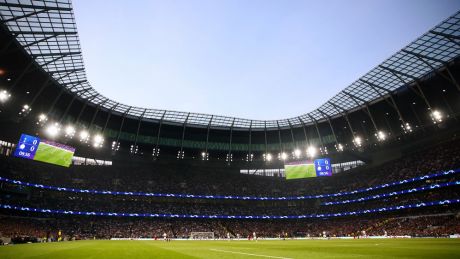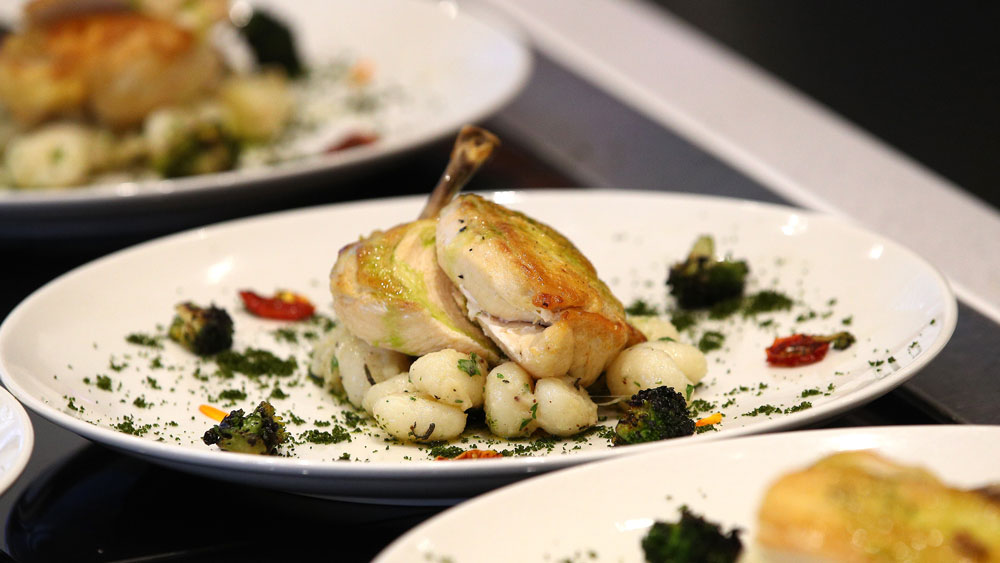Tottenham Hotspur’s Performance Nutritionist On How To Fuel For Match Day
Including advice on what to do if you unexpectedly find yourself on the bench

When the difference between winning and losing a football match can be millions of pounds, you’d better believe that every little thing a club can do to maximise its chances of winning is done.
That’s certainly the case with nutrition at Tottenham Hotspur, where a team of performance nutritionists work alongside top-notch chefs to ensure the players get everything they need to excel on match day.
We recently visited Hotspur Way to mark the launch of the new Amazon Prime Video documentary All or Nothing: Tottenham Hotspur, and got the chance to ask the club’s performance nutritionist Craig Umenyi for some expert advice on how to fuel for your matches like a pro.
What do you need to focus on eating in the build-up to the game?
You’re targeting certain amounts of grams per kilo of bodyweight for your matchday nutrients. The rule of thumb is 6-8g of carbohydrate per kilo of bodyweight over a 24- to 36-hour period before the game. That’s quite a lot, particularly if you’re a larger individual, so realistically you might not consume that much, but that’s the rough target.
Then, for someone who is physically active, you’d want a protein intake of around 2g per kilo bodyweight per day. For a 75kg male that’s 150g of protein. Here’s how that might look: three eggs for breakfast is about 20g of protein. A protein shake after training might be around 30g. At lunch you might have a portion of meat or fish for another 30g. In the afternoon some Greek yogurt with fruit might give you another 20-30g. Then a portion of meat or fish for the evening meal to round it up.
Is it best to try to get the nutrients through several portions?
Even if you could stomach it all in one meal it probably isn’t all going to be digested and you’re not going to be comfortable. Make it more manageable. So if it’s an evening game, it will be over a pre-match meal, lunch, breakfast, and your evening meal the night before. You might even start thinking about snacks the day before, trying to have more carbs. Things like toast or cereal and easy-to-digest desserts, so low-fat but high-carb like rice pudding.
When should you eat your pre-match meal?
We have it 3hr 15min before kick off. There’s good research to suggest that the majority of that carbohydrate is going to be digested and absorbed into the muscles, if you’re eating things like white pasta and rice. If you’re having it too close to competition, say an hour or 90 minutes before, you’re going to have some gut discomfort and you’re not going to get the carbohydrate into the muscles.
Get the Coach Newsletter
Sign up for workout ideas, training advice, reviews of the latest gear and more.
Should you avoid wholegrain carbohydrates because they’re harder to digest?
Yes, and also from an appetite perspective, things like chickpeas and porridge oats are really quite heavy, and most people want to feel light going into a game. So go for white pasta, rice, bread, maybe potatoes or gnocchi. Stuff that’s easily digestible and so you can increase the carbohydrate content without feeling too heavy.

Should you have anything just before the match?
Hydration is a big focus, and we encourage people to have a carbohydrate snack up to 30 minutes before the game. Some people have gels, a Lucozade or a banana, or rice cakes if you don’t want sweet-tasting stuff. We do the same at half-time – a carbohydrate snack, nothing huge, trying to aim for about 30g. And then little things throughout the game where possible.
What do you need to eat after the match?
When you do a really intense workout, you usually feel more sore one to two days after, which is muscle damage from your workout. When the muscle is damaged, it’s very difficult to get carbohydrate into the muscle, so that’s why there’s a big focus to maximise the eight- to 12-hour period after the game to try to get the majority of your carbohydrates in, because that muscle damage hasn’t set in yet.
The appetite might not be there in the period two to three hours after, so it might be more having a recovery shake, which has some protein and carbohydrate, or things that are really easy to digest like rice cakes, fruit loaf or cereal bars. Once your appetite comes back try to eat a solid meal, or even two carbohydrate-rich meals during that eight to 12 hours.
See related
- The Sports Nutrition Mistakes Amateur Footballers Make
- Football Fitness Tests: See How You Compare To The Pros
- Nail Pre-Season Training With These Football Fitness Drills
What should you do if you do all this fuelling and then find out you’re on the bench?
If you’re not playing the full game then that carbohydrate is still stored in your muscles for the next few days, so it might be worth doing some cardio later in the day or the following morning to use up some of that energy and balance your calorie intake.
Amazon Original series All Or Nothing: Tottenham Hotspur follows the team throughout the 2019/20 season. The first three episodes will launch exclusively on Prime Video on Monday 31st August.

Nick Harris-Fry is a journalist who has been covering health and fitness since 2015. Nick is an avid runner, covering 70-110km a week, which gives him ample opportunity to test a wide range of running shoes and running gear. He is also the chief tester for fitness trackers and running watches, treadmills and exercise bikes, and workout headphones.
